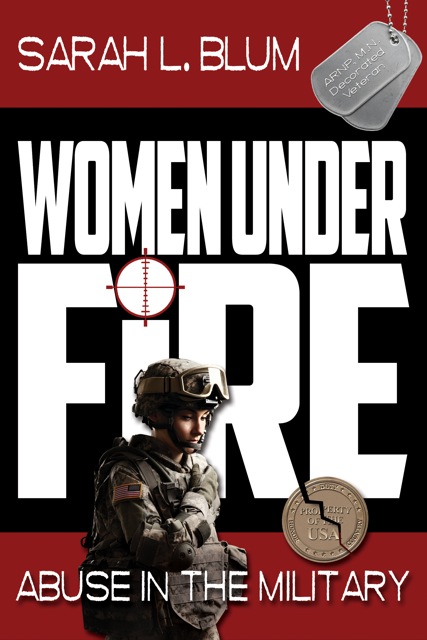Military Sexual Trauma is any sexual abuse experienced in the military from sexual harassment, sexual assault, to rape. It is a personal and sexual boundary violation, which affects the victim emotionally, physically and spiritually. The victim (I will now refer to as a woman) experiences extreme vulnerability, helplessness, shame, humiliation, a breach in her sense <!– ReadMore–> of self and bodily integrity, and a lowered sense of self-esteem and self-confidence. If a fellow soldier, or worse, a superior of higher rank, perpetrated the violation, the woman experiences betrayal. For those who perceive their military unit or the corps as family, the violation equates to incest. One of their own has violated them.
From that moment on she feels unsafe in the military. She has no sense of being protected and safe. She experiences a clear violation and betrayal of the values taught in the military such as honor, respect, accountability, fellowship. She can no longer count on her brother soldiers to ‘have her back’ in combat. It has been referred to as a grievous psychological injury and is an assault on her as a person, her sense of self and her soul, which leaves her reeling in confusion, shock, shame, dismay, disintegration and dissociation. The woman often becomes numb from the dissociation and has less access to her internal resources, even the ability to speak, ask for help, or tell what happened.
MST leads to PTSD—the symptoms begin while the assault is happening; the woman becomes numb and often dissociates. The numbness or dissociation is automatic and unconscious. The woman’s sense of self and bodily integrity have been so violated, that she is unable to stay connected fully to her body and the abusive experience, so she unconsciously attempts to cope in the moment by splitting off part of her self, her energy, her personality. This is often what happens in other traumatic experiences such as combat or combat injury. When the psyche is overwhelmed by an extremely painful experience beyond what is ordinary, the self decides, “I am out of here” and will energetically lift up from the body and observe what is happening to the body. The body is fully experiencing but the psyche and sense of self, splits off, along with the emotions. This dynamic occurs to preserve the self and later becomes the problem to be solved therapeutically, to reconnect all parts of the person, body and emotions, for full healthy functioning.
During a trauma, a common response is to freeze. That freeze state makes it impossible to access normally occurring resources, e.g. the ability to move, run, or speak. A person in that state feels and is helpless.
Many rapes in the military are predatory and include the use of drugs. Drugs, such as Rohypnol cause disorientation, muscle relaxation, slowing of psychomotor abilities, blackouts, and temporary memory loss. Drugs are deliberately used to render the woman incapacitated so she cannot fight back. This then makes the rape a deliberate premeditated attack. It also lends even more credence to so many women who reported that they could not move during the attack.
Whether from a freeze response or being drugged the victim is indeed unable to fight back. Military Sexual Trauma changes everything. Anyone who is sexually assaulted will never be the same again. Their body, mind, emotions and sense of self were violated. They may never feel safe or confident again. If the rape victim is not believed, supported, given the care she needs immediately, treated with dignity, respect, compassion, she is likely to be left with serious symptoms that may never go away. The way our military handles sexual assaults is disrespectful, indignant, cold and harsh. Women are shamed, humiliated, denied compassion, medical care, protection, even the kind of investigation that affirms she is believed and that the military values integrity and accountability. Women who are sexually assaulted in the military are denied justice. The way our military responds to reports of sexual assault re-victimizes the survivor.
Russell Strand, a military criminal investigator and the chief of the Family Advocacy Law Enforcement Training Division at the U.S. Army Military Police School at Fort Leonard Wood said, “Military Sexual Trauma takes away everything your are in a minute” He teaches journalists, police, and first responders how NOT to re-victimize survivors through the use of his forensic experimental trauma interview (FETI) based on brain function and memory. He describes how people do not react the way they might think because the prefrontal cortex shuts down. The trauma is stuck in the parts of the brain that cannot communicate with thinking or under-standing and there is no way to verbalize a coherent description of what took place because the part of the brain that performs that function is shut down. Memories are stored in the right side of the brain in pictures and feelings yet coherent thinking and words require the left side of the brain. These two parts are not communicating when there is a trauma, so what comes out is confused and incoherent. Survivors cannot give a coherent detailed beginning to end narrative account of what happened. The brain under that level of distress notes sounds, smells, tastes, emotions and sensations. When questioned the survivor can literally go back into the traumatic event with a full body reaction including increased heart rate, shortness of breath, shaking, sweating, and have dry mouth. ( from Dart Society Reports. “The Narrative Comes Later.” 12 November 2012

